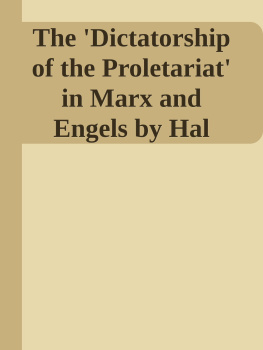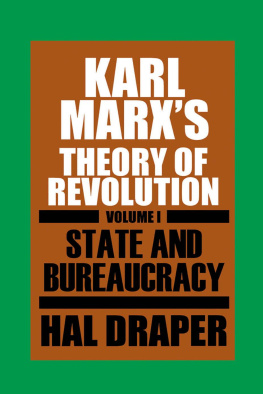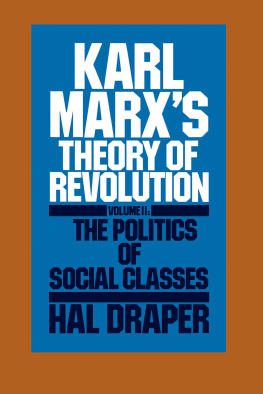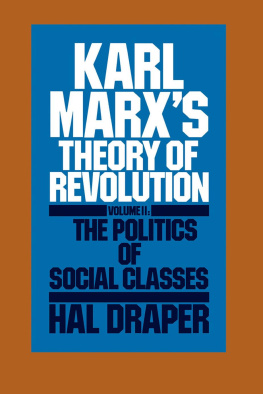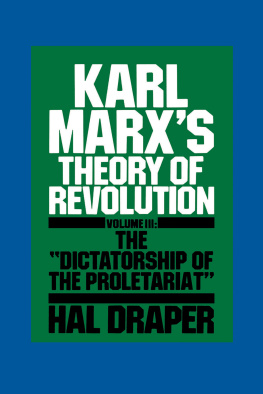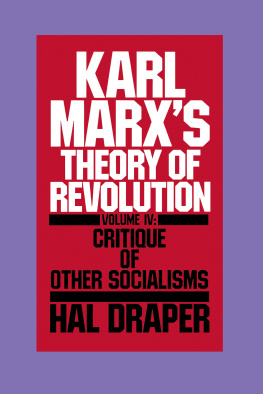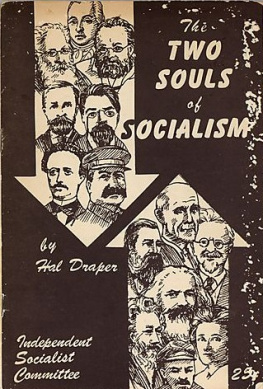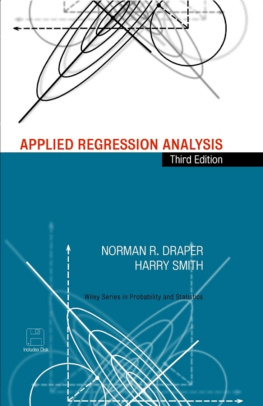Hal Draper - The Dictatorship of the Proletariat in Marx and Engels by Hal Draper 1987
Here you can read online Hal Draper - The Dictatorship of the Proletariat in Marx and Engels by Hal Draper 1987 full text of the book (entire story) in english for free. Download pdf and epub, get meaning, cover and reviews about this ebook. genre: Politics. Description of the work, (preface) as well as reviews are available. Best literature library LitArk.com created for fans of good reading and offers a wide selection of genres:
Romance novel
Science fiction
Adventure
Detective
Science
History
Home and family
Prose
Art
Politics
Computer
Non-fiction
Religion
Business
Children
Humor
Choose a favorite category and find really read worthwhile books. Enjoy immersion in the world of imagination, feel the emotions of the characters or learn something new for yourself, make an fascinating discovery.
- Book:The Dictatorship of the Proletariat in Marx and Engels by Hal Draper 1987
- Author:
- Genre:
- Rating:3 / 5
- Favourites:Add to favourites
- Your mark:
- 60
- 1
- 2
- 3
- 4
- 5
The Dictatorship of the Proletariat in Marx and Engels by Hal Draper 1987: summary, description and annotation
We offer to read an annotation, description, summary or preface (depends on what the author of the book "The Dictatorship of the Proletariat in Marx and Engels by Hal Draper 1987" wrote himself). If you haven't found the necessary information about the book — write in the comments, we will try to find it.
The Dictatorship of the Proletariat in Marx and Engels by Hal Draper 1987 — read online for free the complete book (whole text) full work
Below is the text of the book, divided by pages. System saving the place of the last page read, allows you to conveniently read the book "The Dictatorship of the Proletariat in Marx and Engels by Hal Draper 1987" online for free, without having to search again every time where you left off. Put a bookmark, and you can go to the page where you finished reading at any time.
Font size:
Interval:
Bookmark:
Hal Draper 1987
The Dictatorship of the Proletariat
in Marx and Engels
Source: Chapter 1 of The Dictatorship of the Proletariat from Marx to Lenin, by Hal Draper, Monthly Review Press, 1987.
Copyright: reproduced with permission of Hal Drapers estate at the Center for Socialist History. All rights remain with the authors estate.
1 The Dictatorship of the Proletariat in Marx and Engels
The phrase dictatorship of the proletariat first appeared in a series of articles by Marx, later titled The Class Struggles in France 1848-1850, published in what was then Marxs own London magazine. The first article, written in January 1850, came off the press in early March. The expression or its equivalent appeared not once but three times in each of the three installments (or chapters) that comprised the original series.
This work was Marxs attempt to sum up the political meaning of the European revolution of 1848-49. Marx had taken an active part in
this revolution in the German arena, as editor of the leading organ on the revolutionary left, at the same time closely following the turbulent developments in France and Vienna in particular. The revolution was now over, and Marx was thinking over its lessons.
The first question is: when it appeared in print in the spring of 1850, what did the phrase mean to Marx and to his contemporaneous
readers?
The key fact, which was going to bedevil the history of the term, is this: in the middle of the nineteenth century the old word
dictatorship still meant what it had meant for centuries, and in this meaning it was not a synonym for despotism, tyranny, absolutism, or autocracy, and above all it was not counterposed to democracy.
1. Short Sketch of Dictatorship
The word dictatorship in all languages (dictature, Diktatur, etc.) began as a reference to the dictatura of the ancient Roman Republic, an important constitutional institution that lasted for over three centuries and left its enduring mark on all political thought. This institution provided for an emergency exercise of power by a trusted citizen for temporary and limited purposes, for six months at the most. Its aim was to preserve the republican status quo; it was conceived to be a bulwark in defense of the republic against a foreign foe or internal subversion; indeed it was directed against elements whom we might today accuse of wanting dictatorship. It worked at
least until Julius Caesar destroyed the republican dictatura by declaring himself unlimited dictator in permanence, that is, a dictator in our present-day sense
The modern analogue of the Roman dictatura is the institution of martial law (or state of siege). This device has the three distinguishing features of the Roman one: it is based on constitutional legality, not tyranny; it is temporary; it is limited, especially in its ability to impose new laws or constitutions. Again and again, institutions of the martial-law type have provided for some form of crisis government or emergency regime. Few claim that these institutions are ipso facto antidemocratic, though of course they can be perverted to antidemocratic uses like everything else
The old meaning conditioned all European political thought and language right into the nineteenth century, though the application of the term tended to blur in some respects. Most consistently it kept referring to an emergency management of power, especially outside of
normal legality. The one-man aspect of its meaning was sometimes primary, but it was often muffled, particularly by rightists attacking the dominance of a popularly elected body.
In the French Revolution like all revolutions a bubbling cauldron of political terminology the Girondins liked to denounce the
dictatorship of the National Convention (the zenith of revolutionary democracy at the time) or the dictatorship of the Commune of
Paris (the most democratic expression yet seen of a mass movement from below). For over a century no one would blink when the British Parliament was attacked as a dictatorship on the ground that it held all power, though this usage dropped even the crisis-government aspect of the term.
The history of dictatorship on the left begins with the very first socialist-communist movement, the first fusion of the socialistic idea with membership organization: the so-called Conspiracy of the Equals led by Babeuf in 1796, in the backwash of the failed French
Revolution. In an influential book published in 1828, Babeufs lieutenant Buonarroti described the activity and politics of this movement in some detail, thereby producing a textbook of Jacobin-communist politics that helped educate (and miseducate) the Blanquist leftists of the next two decades. (It was quickly published in English by left Chartists.)
Buonarroti described the conspirators discussion on the transitional revolutionary government to take power after victory. While
eschewing the term dictatorship because of its one-man meaning, he left no doubt that the revolutionary government was to be the
dictatorship of the small band making the revolution, which had the task of educating the people up to the level of eventual democracy.
This concept of Educational Dictatorship was going to have a long future before it. There was not the slightest question of a dictatorship
of, or by, the working-people, corrupted as they were by the exploitive society to be overthrown. The revolutionary band of idealistic dictators alone would exercise the transitional dictatorship, for an unspecified period of time, at least a generation.
This was also the entire content of the concept of dictatorship held by Auguste Blanqui and the Blanquist bands of the thirties and forties.
In addition, the Blanquists (and not only they) advocated the dictatorship of Paris over the provinces and the country as a whole
which meant, above all, over the peasants and the rural artisanry; for had not the provinces shown in the Great Revolution that they
tended toward counterrevolution? In the name of The People, the revolutionary saviors would defend the revolution against the people.
Incidentally, the ascription of the term dictatorship of the proletariat to Blanqui is a myth industriously copied from book to book by marxologists eager to prove that Marx was a putschist Blanquist, but in fact all authorities on Blanquis life and works have
(sometimes regretfully) announced that the term is not to be found there. More important, the concept of political power exercised by the democratic masses is basically alien to the Blanquist idea of Educational Dictatorship.
By the nineteenth century political language had long included references to the dictatorship of the most democratic assemblies, of popular mass movements, or even of The People in general. All Marx did at the time was apply this old political term to the political power of a class.
But Marxs usage in 1850 was significantly conditioned not merely by the long history of the word but particularly by its history in the revolutionary period he had just passed through.
2. Dictatorship in the 1848 Revolution
Revolutions are by nature periods of crisis management and emergency power, in which the old legalities totter or tumble. This is true on both sides, for counterrevolutions are no greater respecters of legality. The revolution of 1848 saw the imposition of a dictatorship, that of General Cavaignac, which was the herald of its modern history. But the necessity of some sort of dictatorship (in the terminology of the day) was recognized on all sides and freely discussed by the most disparate political tendencies from right to left
The essential meaning of dictatorship at this time can be seen best in the case of Louis Blanc, one of the pinkest social-democrats in the early history of the movement. He constituted the left wing of the provisional government that took power in the February Revolution.
Next pageFont size:
Interval:
Bookmark:
Similar books «The Dictatorship of the Proletariat in Marx and Engels by Hal Draper 1987»
Look at similar books to The Dictatorship of the Proletariat in Marx and Engels by Hal Draper 1987. We have selected literature similar in name and meaning in the hope of providing readers with more options to find new, interesting, not yet read works.
Discussion, reviews of the book The Dictatorship of the Proletariat in Marx and Engels by Hal Draper 1987 and just readers' own opinions. Leave your comments, write what you think about the work, its meaning or the main characters. Specify what exactly you liked and what you didn't like, and why you think so.

